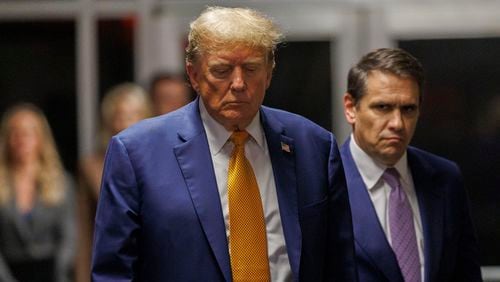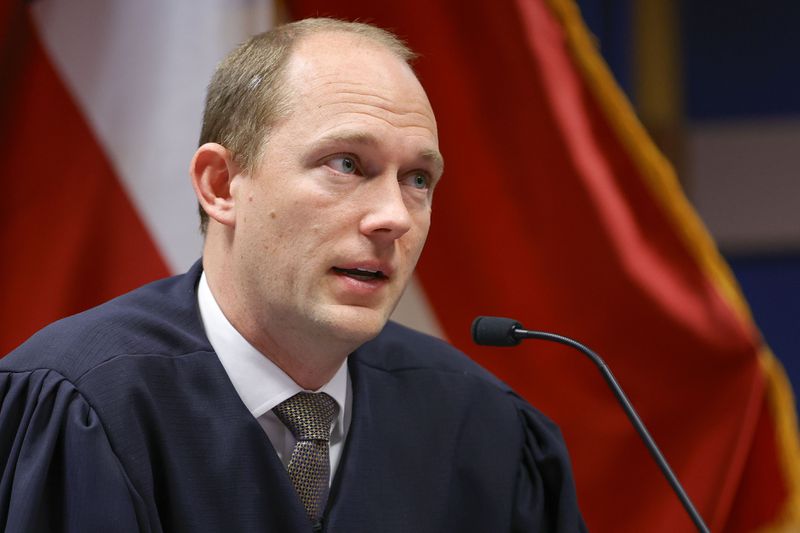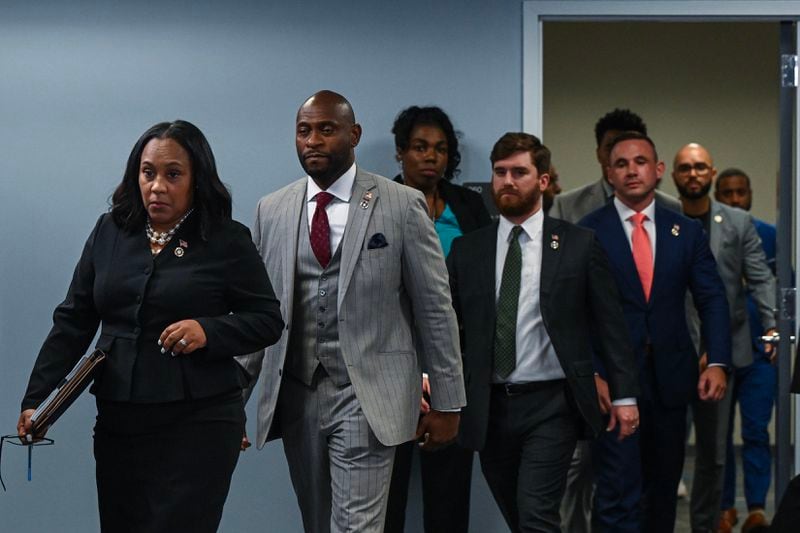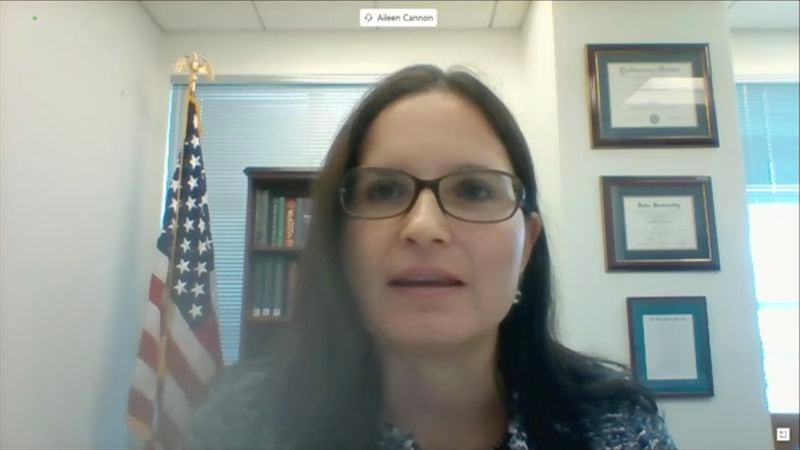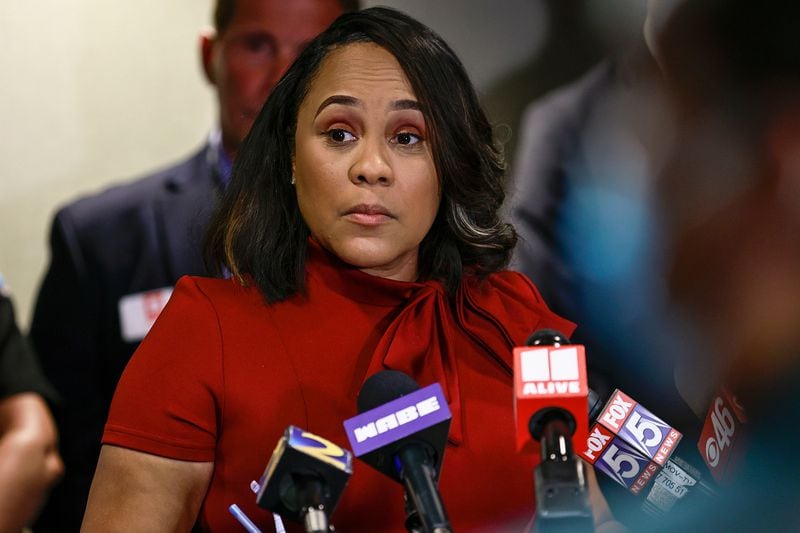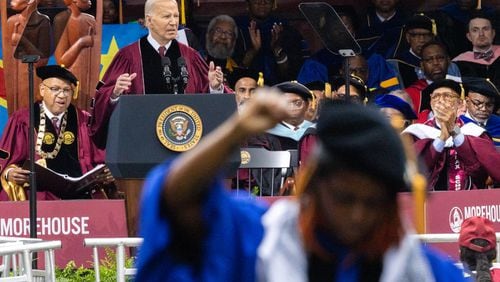The Georgia Court of Appeals on Wednesday decided to hear an appeal of a judge’s ruling allowing District Attorney Fani Willis to remain at the helm of Fulton County’s election interference case against former President Donald Trump.
The court’s decision almost certainly means a significant delay of a trial here for Trump and his 14 co-defendants and signals that Willis could still be disqualified from the case, the biggest in her career and one she spent years assembling. It is unclear how long the busy appeals court will take to decide the issue but it could stretch into 2025.
“There’s no way this case gets to trial this year,” said Atlanta defense attorney Andrew Fleischman, who is closing following the case. “I would expect the appeals court to issue its opinion some time next year.”
On March 29, Superior Court Judge Scott McAfee issued a “certificate of immediate review,” which allowed the defendants to appeal his ruling to the Georgia Court of Appeals before a trial begins.
Credit: AP
Credit: AP
Under appeals court rules, such a pretrial — or interlocutory — appeal is typically assigned to a three-judge screening panel. And all it takes is for one of those judges to decide whether the court accepts the appeal. The court’s order one-page order did not divulge which judge voted to grant the application. It gave the defense 10 days to file its formal notice of appeal.
In his order granting the pre-trial review, McAfee said he will continue working on the case, resolving pending motions, while the appeals court takes up the removal issue. It is possible Trump or his co-defendants could seek a stay from the appeals court barring McAfee from moving forward with his work on the case until the appeal is resolved.
Eight defendants, including Trump, requested permission to appeal a few days after McAfee effectively denied a motion to disqualify Willis due to her romantic relationship with then-special prosecutor Nathan Wade.
While McAfee ruled that Willis did not have an actual conflict of interest that warranted her removal, he said there was an appearance of a conflict that required her to make a choice. Willis could either recuse herself and her office from the case or cut ties with Wade, McAfee said. Within hours, Wade had tendered his resignation.
The Fulton DA’s office on Wednesday declined to comment.
Trump’s lead Atlanta lawyer, Steve Sadow, applauded the decision.
“President Trump looks forward to presenting interlocutory arguments to the Georgia Court of Appeals as to why the case should be dismissed and Fulton County DA Willis should be disqualified for her misconduct in this unjustified, unwarranted political persecution,” Sadow said.
Fleischman said he understood why the appellate court agreed to decide the disqualification challenge.
“This issue is important,” he said. “You’re prosecuting the former president of the United States. This is obviously an area of the law that needs clarification. ... It’s so important to the outcome of the case.”
Attorneys for Trump and eight co-defendants told the appeals court that McAfee erred in failing to disqualify Willis and that mistake should be resolved before the case goes to trial.
Credit: NYT
Credit: NYT
Wade’s resignation, they argued, did not cure the appearance of impropriety, which McAfee said in his ruling existed.
As a result, “neither the public nor the accused can have the required confidence in the impartiality and fairness of the criminal process,” they said.
The defense attorneys also contended Willis should have been removed for suggesting during a Jan. 14 speech at Big Bethel AME Church that the initial defense motion that criticized Willis’ relationship with Wade was racially motivated.
In response, the DA’s office said there was no basis for the appeals court to decide the issue. Prosecutors noted McAfee concluded the church speech did not “cross the line” and that the case is “too far removed from jury selection for any actual prejudice or improper effect on the jury pool to actualize.”
As for the relationship between Willis and Wade, the DA’s office noted Wade withdrew as special prosecutor shortly after McAfee issued his order. “Accordingly, the trial court properly exercised its discretion and inherent authority in denying the motion to disqualify based on an appearance of impropriety,” the DA said.
The exact timeline for when the court would take up the disqualification appeal is unclear.
Fulton Superior Court must first prepare the record from the first round of the removal fight and send it to the appeals court. Only then can the case be docketed and a panel of three judges randomly assigned via the court’s computer system, according to Christina Cooley Smith, deputy court administrator for the Court of Appeals.
It is then up to the judges to decide when they would like to hear oral argument, said Smith, but the matter must be decided within two terms of court. That means that if it’s docketed before July, it would need to be heard and decided before mid-March 2025.
The Fulton case is not the only criminal proceeding against Trump that is delayed.
U.S. District Court Judge Aileen Cannon on Tuesday canceled the May 20 trial date that had been set for Trump’s classified documents trial in Florida. Her move indefinitely postponed the federal case, brought by Justice Department special counsel Jack Smith, and substantially raised the likelihood that it wouldn’t be tried before Election Day.
Credit: TNS
Credit: TNS
Smith’s other case against Trump, which focuses on the Republican’s attempts to cling to power in the aftermath of the 2020 election, has also been paused as the U.S. Supreme Court decides whether presidents should be immune for their actions while in office. Justices aren’t expected to announce their decision on the matter until late June, and based on their comments during last month’s oral arguments could instruct a lower court to take other action before Smith could move forward.
A third criminal trial, involving alleged hush money payments, is underway in Manhattan.
Separately on Wednesday, the Court of Appeals rejected an appeal from Harrison Floyd, one of Trump’s co-defendants in the Fulton election interference case.
Floyd has argued the case should be dismissed because the State Election Board – not Willis’ office – has exclusive authority to initiate and refer criminal investigations concerning elections. Superior Court Judge Scott McAfee rejected that argument in January and again in March.
Credit: TNS
Credit: TNS

